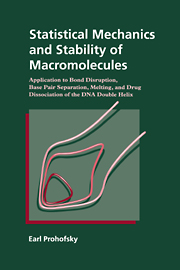 Statistical Mechanics and Stability of Macromolecules
Statistical Mechanics and Stability of Macromolecules Book contents
- Frontmatter
- Contents
- Preface
- 1 Introduction
- 2 Macromolecular stability
- 3 Lattice dynamics
- 4 Effective phonon theory
- 5 Premelting disrupted chemical bonds
- 6 Cooperative melting
- 7 Strained chemical bonds: salt and pressure effects
- 8 Bond disruption and conformation change: B to Z conformation change in DNA
- 9 Hydration effects: structural water
- 10 Helix with daunomycin intercalated: increased helix stability and daunomycin-DNA binding constant
- 11 Nonrepeating DNA
- 12 Cutting and splicing: junctions, inserts, and the replicating fork
- 13 Interaction between a helix and a single attached molecule
- 14 Energy considerations in bond opening
- Appendix 1 Helical lattice dynamics
- Appendix 2 Density matrix and effective phonon theory
- Appendix 3 Green functions
- References
- Index
3 - Lattice dynamics
Published online by Cambridge University Press: 16 September 2009
- Frontmatter
- Contents
- Preface
- 1 Introduction
- 2 Macromolecular stability
- 3 Lattice dynamics
- 4 Effective phonon theory
- 5 Premelting disrupted chemical bonds
- 6 Cooperative melting
- 7 Strained chemical bonds: salt and pressure effects
- 8 Bond disruption and conformation change: B to Z conformation change in DNA
- 9 Hydration effects: structural water
- 10 Helix with daunomycin intercalated: increased helix stability and daunomycin-DNA binding constant
- 11 Nonrepeating DNA
- 12 Cutting and splicing: junctions, inserts, and the replicating fork
- 13 Interaction between a helix and a single attached molecule
- 14 Energy considerations in bond opening
- Appendix 1 Helical lattice dynamics
- Appendix 2 Density matrix and effective phonon theory
- Appendix 3 Green functions
- References
- Index
Summary
The harmonic approximation
Condensed matter physics made great progress by concentrating on excitations and avoiding the problem of ab initio solution of the conformation of crystals. The conformation or ground state problem is the determination of the static equilibrium structure of a system and is a difficult problem. For most crystals the ground state problem is still an unsolved theoretical problem. An example of progress without first solving for the ground state was the development of phonon theories for determining the motion of the atoms of a solid. Phonon is the term used to describe quantized propagating normal mode vibrational excitations and is used in analogy to photon, which describes the quantized propagating excitations of the electromagnetic field. Propagation of excitations is an essential element of large systems. Phonon theories apply not only to equilibrium phenomena such as the study of internal energy and specific heats but also to dynamic problems such as electrical and thermal conductivity. The study of excitations with the ability to propagate is an improvement over simple vibrational mode studies that only deal with static equilibrated systems. As we will discuss in later chapters, the propagation of energy along the helix is relevant to a number of biological processes and the distinction between propagating excitations and static excitations will be of importance.
Phonons are the principal excitations found in insulators and are important excitations in all types of condensed matter.
- Type
- Chapter
- Information
- Statistical Mechanics and Stability of MacromoleculesApplication to Bond Disruption, Base Pair Separation, Melting, and Drug Dissociation of the DNA Double Helix, pp. 47 - 59Publisher: Cambridge University PressPrint publication year: 1995
